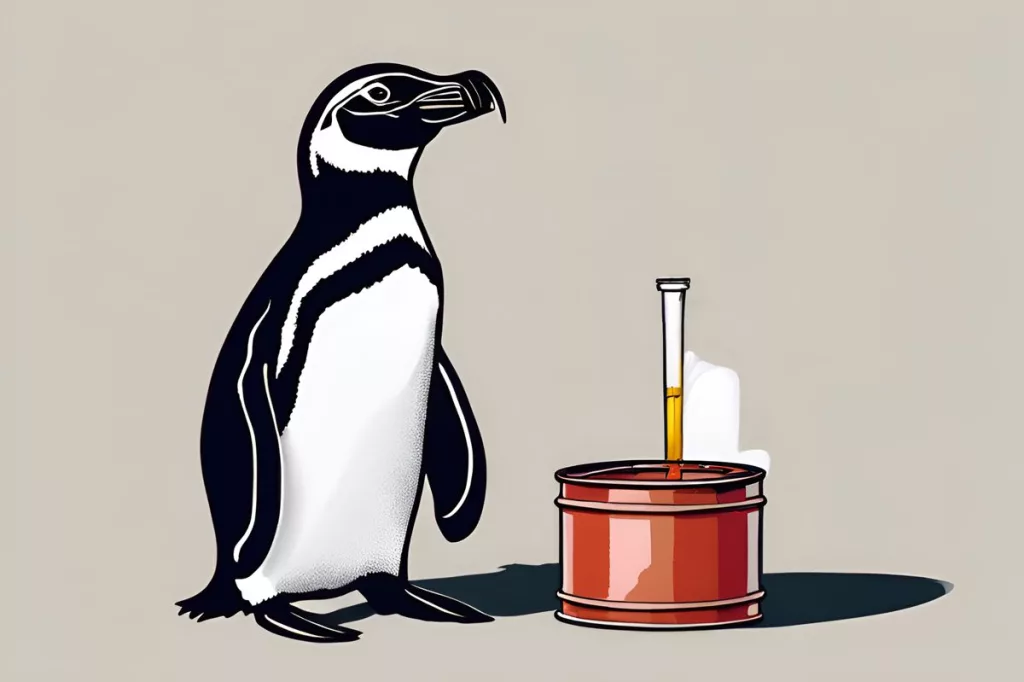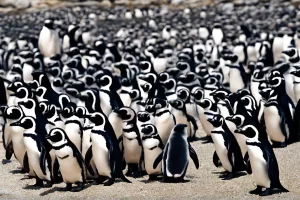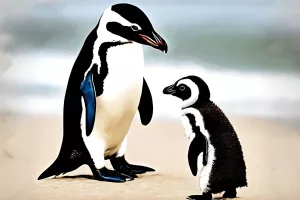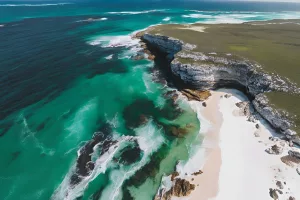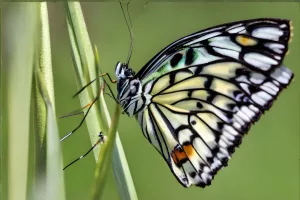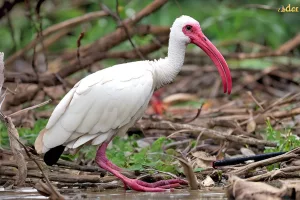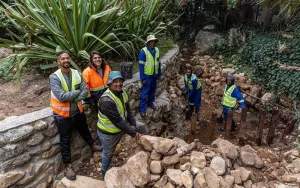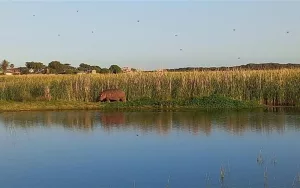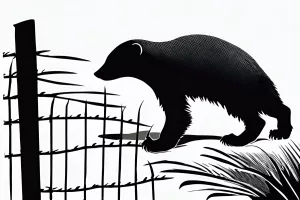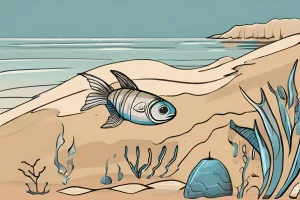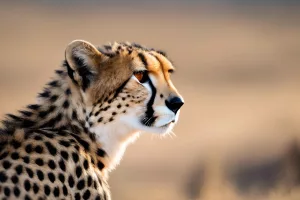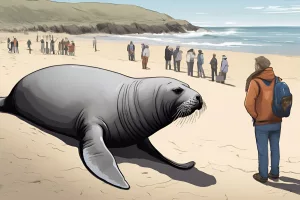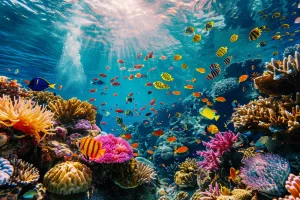The African Penguin population has declined by more than half in the last decade, with only about 31,700 individuals left across their entire habitat. In 2000, an ecological disaster caused by the sinking of a fully loaded MV Treasure orecarrier led to over 40% of the global population of African Penguins being drenched in deadly heavy fuel oil. A paper published in Ostrich: Journal of African Ornithology suggests that the African Penguin meets the criteria to be classified as ‘critically endangered’, and the IUCN will make a final decision on its status on October 22.
Beaumont Estate is a winery in South Africa’s Western Cape that practices sustainable living and has a strong connection to its terroir. The estate is dedicated to preserving the local ecosystem and offers visitors the chance to explore the stunning natural wonders of the Kogelberg Biosphere. Beyond winemaking, Beaumont is a living testament to sustainable living and an appreciation for nature, offering a unique and immersive experience. The estate embodies a lifestyle that reveres nature, celebrates its abundance, and preserves its splendor for future generations.
The African penguin population is at risk of extinction due to a dwindling availability of prey, with conservationists predicting they could disappear entirely by 2035. The Simon’s Town colony is a beacon of hope, as it has managed to maintain stability largely due to the prohibition of commercial fishing for small pelagics in False Bay since the 1980s. Despite legal battles to replace ineffective fishing closures, the delicate balance between commerce and conservation highlights the need to safeguard Earth’s biodiversity.
SANCCOB is a critical conservation organization in Cape Town that runs the Chick Rearing Unit (CRU) to protect African penguin eggs and chicks. Due to the decline of the African penguin population, the CRU is feeling pressure and urgently needs renovations and expansion to care for more atrisk animals. The new building will allow SANCCOB to accommodate double the number of abandoned and rescued African penguin eggs and chicks and potentially increase release rates. The organization’s efforts are critical to the survival of the threatened African penguin species, which could face extinction by 2035 if the trend continues unchecked.
De Hoop Nature Reserve is a stunning 36,000hectare reserve in South Africa’s Overberg region, just a threehour drive from Cape Town. It offers a range of accommodations and is home to diverse wildlife, from Cape Mountain zebras to southern right whales. Visitors can enjoy hiking, biking, marine walks, and beachcombing while also supporting the reserve’s commitment to conservation and sustainable management. De Hoop is an adventurer’s playground and a biodiverse haven worth exploring.
The endangered Barber’s Cape Flats Ranger butterfly, with a population of only fifty, is found exclusively in Strandfontein and is under threat due to plans for a multilevel development project in the area. The proposed development could increase traffic, which is already causing butterfly deaths due to collisions and pollution, leading to the loss of the butterfly species and disturbing the ecological function of the area. The potential consequences of these development plans go far beyond the butterflies, affecting other animals that inhabit the increasingly fragmented habitat and calling for immediate conservation actions.
The Hadeda Ibis has a unique sensory adjustment that allows it to locate its underground prey by detecting vibrations generated by them beneath the soil surface, known as remotetouch. This ability heavily depends on the moisture content of the soil, making human soil irrigation inadvertently aid the ibises’ range expansion, as it provides more moist substrates for them to sense their prey. The study sheds light on the importance of acknowledging the sensory needs of wetland birds in conservation efforts, particularly in a time marked by continuous environmental changes.
Cape Town’s Catchment, Stormwater, and River Management department is leading a largescale project to rejuvenate the Blinkwater Stream in Camps Bay. The project aims to repair the concretelined channel, construct two silt basins upstream to trap large boulders, and equip the city to better resist future weather adversities. The innovative project, which integrates several detailed strategies, reflects the city’s commitment to sustainability and proactive infrastructure maintenance.
The 2024 PONDO Trail Run is an annual trail running event in Pondoland, raising funds for philanthropic causes like conservation and corrective surgeries for children with cleft conditions. The event is a celebration of adventure, camaraderie, and purpose, with partnerships with companies dedicated to environmental stewardship and societal obligation. The upcoming event also includes an initiative called ‘Gift of Warmth,’ encouraging participants to donate warm clothing and blankets for children in need. The event transcends being a mere sporting event and embodies resilience, spirit, and collective commitment to making a lasting impact on the world.
Experience the wonder of a family of Common Hippopotamus living in the heart of Cape Town’s False Bay Nature Reserve. These hippos have been shaping the wetland ecology under the City’s Biodiversity Management team’s vigilant supervision since 1981, and their survival and thriving are a tribute to the relentless work of conservationists. Hippos are native to Africa and face multiple threats, including habitat loss, poaching, humanwildlife conflict, climate change, and uncontrolled trade, making the City’s commitment to preserving this distinct population all the more crucial.
In the tranquil De Hoop Nature Reserve, conservationists Christina Hagen and Katta Ludynia discovered the lifeless bodies of 11 African penguins, victims of a honey badger attack. Despite this tragedy, the conservation team quickly sought advice and devised new safety measures to protect the penguin colony and prevent future attacks. The African penguin population is critically low, but with the dedication of organizations like CapeNature and BirdLife South Africa, there is hope for the survival of this extraordinary species.
Conservationists are working to save the unique Clanwilliam sandfish from extinction by rescuing young fish from the Biedouw River and relocating them to dam “nurseries” on private farms. Thanks to this initiative, hundreds of sandfish have returned to the river to breed, indicating a positive impact on their population. The success of this collaboration between conservationists, farmers, and community members serves as an example of the power of preserving biodiversity and the interdependence of all life forms.
A wild female elephant has been discovered in the Knysna forest, and people are considering introducing more elephants into the area to strengthen ecological balance and maintain cultural and historical values. However, commercial motivations must be avoided, and management plans should be guided by elephant experts. Evaluations have shown that the Garden Route elephant range would thrive with the addition of these majestic creatures. Sustainable and informed management is necessary to ensure the survival of these gentle giants.
Sanbona Wildlife Reserve is a massive nature reserve in South Africa that covers 54,000 hectares of preserved ecosystems. It was born from a vision to protect endangered landscapes and create job opportunities in a poor region. Guests can stay in three luxury lodges and enjoy nature drives and walking safaris, as well as stargazing and rock art. Sanbona is a stunning example of conservation and is a mustvisit for nature lovers.
Buffel is a southern elephant seal who visits Cape Town’s beaches every year to shed his skin. Despite usually living in the Southern Ocean, Buffel has an unusual fondness for Cape Town’s beaches and his annual visits serve as a reminder of the important role elephant seals play in marine ecosystems. They act as apex predators, regulating the population of prey species and contributing significantly to nutrient cycling. Buffel is also an indicator species, providing valuable data about the health of our oceans and the threats they face, and serves as a reminder of our responsibility to protect threatened species and maintain the delicate balance of our ecosystems.
Diving in the Western Cape of South Africa is a thrilling and unique adventure, offering beautiful underwater landscapes and a diverse range of marine life. The region is divided into three chief sections, each with its distinct allure. Responsible diving is promoted, with training centers offering courses for all levels of divers and opportunities to contribute to marine conservation. From exploring shipwrecks to engaging with friendly marine creatures, the Western Cape promises an unforgettable experience for all divers.

